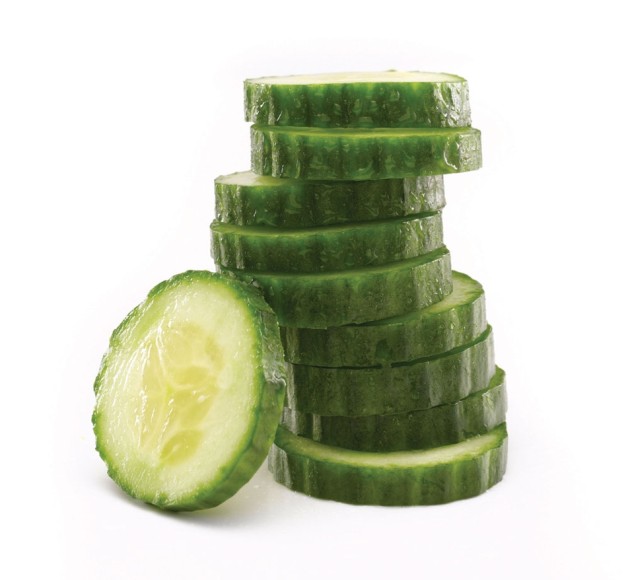
Cucumbers can help maintain a healthy pH balance.
Best Foods for Healthy Digestion
A balanced, nutrient-dense whole foods diet is my top recommendation for overall wellness, but it’s especially important for digestive health. Here are some of the best foods to keep your digestive system running smoothly:
Fiber
One of the best types of nutrients for digestion is fiber. Fiber keeps things moving, preventing your colon from collecting toxins that can build up and cause disease. Sources of healthy fiber include fruits such as prunes, gluten-free grains such as quinoa, legumes, and chia or flax seeds.
Alkaline Foods
Many of the body’s systems and organs have “homeostatic” mechanisms in place to respond to pH changes and readjust alkaline/acid levels as needed. A chronically acidic state can tax these mechanisms and cause symptoms including digestive impairment and others. To maintain a healthy pH balance, emphasize alkaline foods such as cucumber, kale, kelp, spinach, parsley, broccoli, sprouts (soy, alfalfa, etc.), sea vegetables, and others.
Herbs and Spices
Ginger, chamomile, and mint are especially comforting for the stomach and contribute to healthy digestion. They ease stomach irritation and relax the smooth muscles of the digestive tract.
Fermented Foods
Cultured, fermented foods such as yogurt, sauerkraut, kefir, kim chi, and others are rich in digestive enzymes and beneficial probiotic bacteria strains. Food-based probiotics and enzymes perform numerous health-promoting functions – from improved nutrient absorption and increased immunity to balanced mood, and more.
Foods to Limit or Avoid
Certain types of foods are notorious for causing digestive discomfort, including indigestion, nausea and bloating, and can lead to long-term digestive impairment. Here are some top offenders:
Dairy
One of the hardest food groups on the digestive system is dairy. The lactose found in milk and other dairy products can contribute to gas, bloating, diarrhea, and digestive dysfunction, especially in people with lactose intolerance.
Gluten
Gluten-rich foods such as wheat, barley and rye products can interfere with digestive capacity. They have also been found to contribute to inflammatory conditions, autoimmune disorders, neurological and behavioral illness, skin diseases, osteoporosis, chronic fatigue, and other degenerative conditions.
Processed Foods
The highly refined, artificial ingredients and packaging agents present in processed foods contribute to toxic build up and digestive impairment. Additionally, beverages such as carbonated sodas, coffee and alcohol can create an over-acidic environment within your digestive system, and cause long-term health problems. Emphasize foods and beverages that are unprocessed or available in their most natural state.
Natural Remedies
Supplements are especially important for digestive health, as they can offer significant and relatively fast-acting support. Here’s a list of key nutrients for digestive and overall health:
Probiotics and Prebiotics
These are two of the most important supplements for healthy digestion. Probiotics provide live strains of friendly bacteria that are critical for digestive and overall health. Prebiotics ensure that your friendly flora enjoy a nourishing environment in which they can thrive.
Zinc
This is an important nutrient for digestive health, and also plays critical roles in hormone regulation, immune health and neurological function.
Proteolytic Enzymes
These enzymes increase digestive capacity and nutrient absorption, boost immunity, and support vital energy.
Integrative Digestive Formula
This is a unique formula containing a blend of “warming” herbs, such as pomegranate seed, licorice root, a specific mushroom blend, enzymes and nutrients, that is used to alleviate digestive discomfort and promote long-term digestive health.
Organic Ten Mushroom Formula
This is a synergistic formula of ten organic medicinal mushrooms, which can help strengthen digestion, improve nutrient assimilation, detoxify the colon, and support overall health.
Digestion-Friendly Eating Habits
These healthy habits can improve overall digestion and vitality.
– Have your doctor test for food allergies and sensitivities, particularly to gluten.
– Refrain from eating for two to three hours before bedtime.
– Drink plenty of filtered water and herbal teas for proper hydration.
– Find healthy ways to relieve stress such as meditation, exercise, and laughter.
– Practice yoga for improving digestive function and reducing stress.
– Limit your use of over-the-counter and prescription drugs.
– Limit caffeine and alcohol, which damage “friendly” digestive bacteria.
Digestion is an intricate and complex network connected to numerous other organs and systems of the body. Oftentimes, problems in other areas may first manifest as digestive discomfort, and vice versa. So for optimal health and wellness, it’s important to listen to your gut!